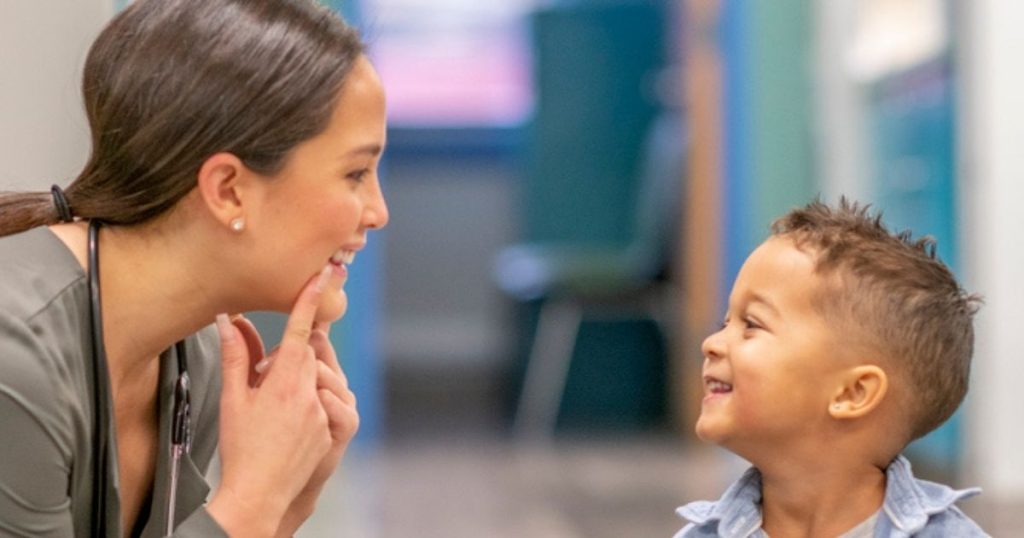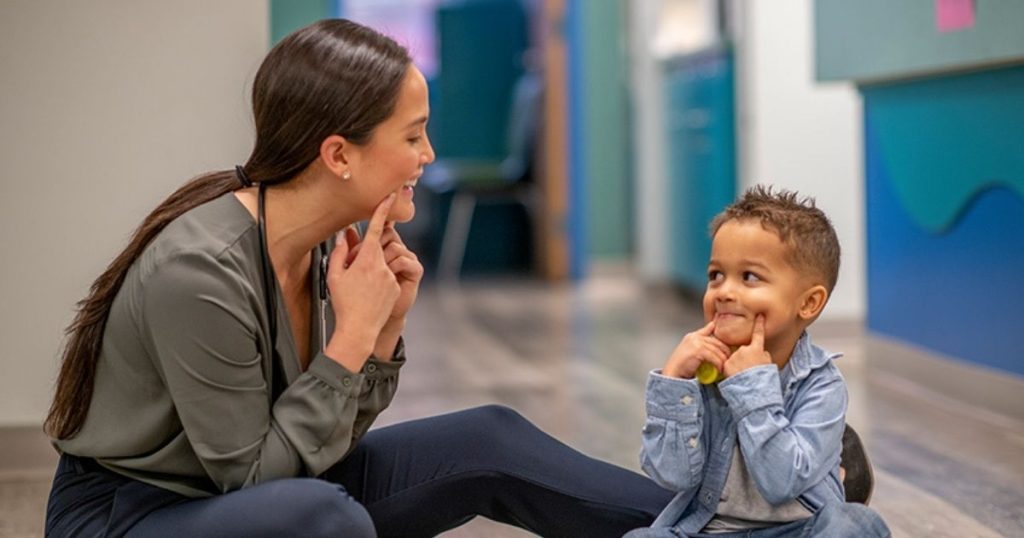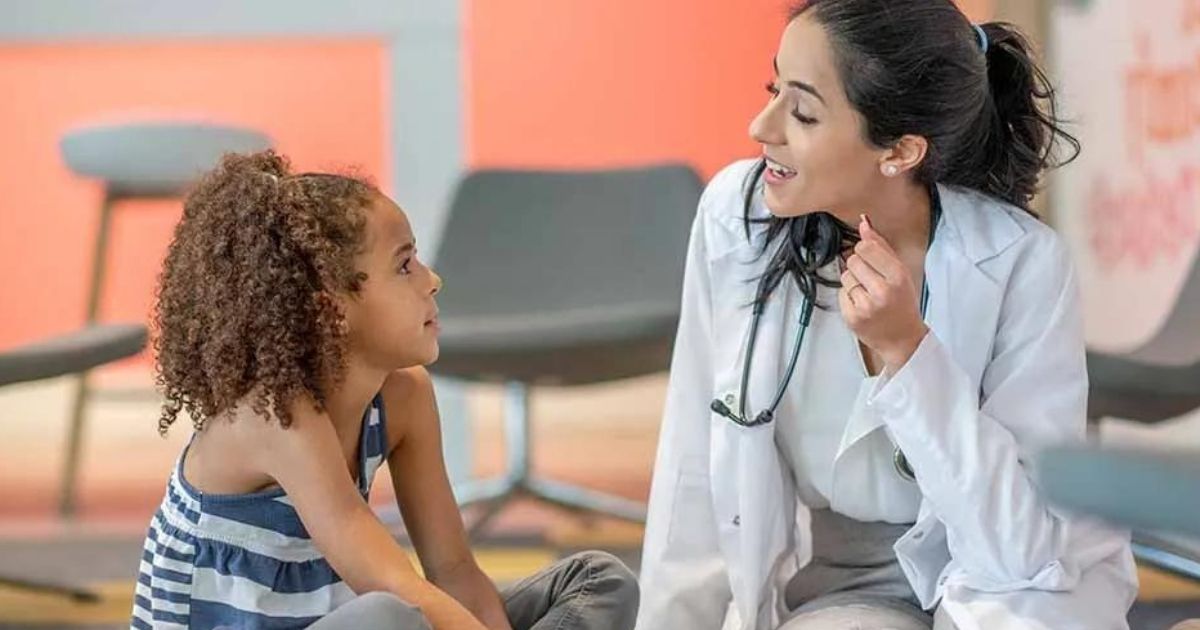”What is the purpose of speech therapy?” This is a common question asked by parents seeking help for their children with communication challenges. A speech-language pathologist (SLP) plays a crucial role in supporting children’s speech and language development.
This skilled professional specializes in diagnosing and treating a wide range of speech and language delays and disorders, offering invaluable assistance to children facing challenges in these areas.
From toddlers struggling with articulation to school-aged kids grappling with language comprehension, an SLP can provide tailored therapy and strategies to enhance communication skills and boost your child’s confidence.
So, keep reading to discover how an SLP can be a transformative ally in your child’s linguistic journey.
Speech Language Pathologist Treatment That Can Help Your Child

A pediatric speech-language pathologist possesses a unique skill set that can profoundly benefit your child’s communication and overall development. This dedicated professional offers numerous ways to assist children facing speech and language challenges.
From articulation therapy to language comprehension strategies, SLPs diagnose and treat various issues. They provide personalized interventions that address speech impairements, stuttering, social communication difficulties, and more. Additionally, SLPs offer guidance to parents and educators, fostering a collaborative approach to support the child’s progress.
The ten major methods a pediatric speech-language pathologist uses in speech therapy to support and boost your child’s verbal development and subjective well-being are detailed in the following section.
Expressive Language Skills
For children, expressive language development begins early on as they learn to convey basic needs and emotions. As they grow, their vocabulary expands, and they acquire the grammatical structures needed for more complex communication.
Expressive language skills also involve using appropriate tone, pitch, and body language to convey meaning. Pediatric speech-language pathologists evaluate and enhance language skills, to promote vocabulary development, syntax, and functional communication.
They work with clients to build vocabulary, improve sentence structure, enhance storytelling abilities, and refine social communication skills. SLPs tailor their interventions to address specific communication challenges, helping individuals become more effective and confident communicators.
Speech Fluency/Stuttering
Speech-language pathologists are well-trained and highly qualified to diagnose and treat stuttering. This experienced practitioner specializes in identifying and treating various speech differences, providing invaluable support to children who face such challenges. They employ a range of therapeutic strategies, including speech exercises, systems to manage tension, and desensitization to challenging speaking situations.
SLPs also work with clients to enhance communication attitudes and self-esteem. Effective intervention by SLPs can significantly improve speech fluency, allowing individuals who stutter to communicate more confidently and with reduced interruptions.
Early intervention is especially important in children, as it can prevent the development of long-term speech fluency issues and associated emotional challenges. SLPs play a vital role in helping individuals achieve fluent and confident communication.
Receptive Language/Listening Skills

Receptive language, often called listening skills, is the capacity to understand and process spoken or written language effectively. For children, receptive language development begins early, with infants recognizing familiar voices and sounds.
As they grow, they learn to identify words, understand complex sentences, and extract meaning from context. Children with receptive language disorders may struggle to follow directions, participate in classroom activities, or engage in conversations.
SLPs work with children of all ages to address listening comprehension challenges, auditory processing difficulties, and language processing disorders. In addition, SLPs employ techniques such as auditory training exercises and interactive activities to enhance receptive language abilities.
Articulation Skills/Speech Intelligibility
Speech-language pathologists (SLPs) are experts in assessing and improving articulation skills, speech sound disorders, and overall speech intelligibility. They work with individuals of all ages to identify specific speech sound errors or patterns and design targeted therapy programs to address them.
These interventions may involve techniques, strategies, and games, to help individuals produce speech sounds accurately and consistently. Improved articulation skills enhance communication, boost self-confidence, and reduce frustration.
Whether correcting common childhood articulation errors or addressing speech difficulties resulting from medical conditions, SLPs play a vital role in helping individuals achieve clear and effective communication, fostering success in various aspects of life.
Social/Pragmatic Language
Children with a social communication disorder may struggle with various aspects of communication, such as taking turns in conversation, interpreting non-verbal cues (like body language and facial expressions), understanding humor, and using language to express empathy or persuasion.
In addition, SLPs work with individuals of all ages to develop strategies for effective social communication, including teaching conversational norms, improving perspective-taking abilities, and enhancing social problem-solving skills.
By addressing pragmatic language challenges, SLPs help individuals become more adept at navigating the complexities of social interactions, leading to improved relationships, self-confidence, and overall communication success.
Augmentative and Alternative Communication (AAC)
Augmentative and alternative communication (AAC) refers to a diverse range of methods and tools designed to support individuals who face challenges in traditional verbal communication. AAC systems are essential for individuals with autism, cerebral palsy, stroke, or other speech and language disorders.
SLPs play a crucial role in AAC implementation. They assess an individual’s communication needs, select appropriate AAC tools, and provide training to the individual and their caregivers to maximize its effectiveness.
AAC empowers individuals with a voice and enhances their independence, participation in educational and social settings, and overall quality of life. It is a vital resource in ensuring that everyone can communicate and connect with the world around them, regardless of their communication challenges.
Cognitive-Communication Skills

Strong cognitive-communication skills are essential for academic success, work, and daily life. They enable individuals to comprehend complex information, express their thoughts clearly, and engage in effective problem-solving during conversations and interactions.
Speech-language pathologists (SLPs) possess expertise in evaluating and remedying cognitive-communication deficits. They collaborate closely with individuals to cultivate strategies aimed at improving cognitive capacities essential for effective communication.
These strategies encompass the integration of memory aids, exercises to bolster attention, and problem-solving methodologies. Additionally, SLPs cooperate with healthcare professionals from various disciplines to deliver comprehensive care to individuals with cognitive communication impairments.
Voice and Resonance
Problems with voice and resonance can lead to hoarseness, breathiness, pitch problems, or voice disorders like vocal nodules or polyps. These challenges can affect vocal quality, overall communication, and self-confidence.
Speech-language pathologists work with children to improve vocal techniques, optimize breathing patterns, and address pitch, volume, and resonance issues. Additionally, SLPs also help children develop strategies to prevent vocal strain and maintain vocal health.
Whether helping professional speakers maintain a strong and clear voice or assisting individuals with voice disorders in regaining their vocal capabilities, SLPs play a vital role in ensuring effective and healthy communication through voice and resonance.
Swallowing/Feeding Issues
Swallowing is a complex neuromuscular process that requires precise muscle and nerve coordination in the mouth and throat. Problems with dysphagia can result in discomfort, aspiration (food or liquids entering the airway), malnutrition, dehydration, and respiratory issues.
Speech-language pathologists perform thorough assessments to pinpoint the root causes of dysphagia and create customized treatment strategies. These interventions include enhancing oral motor skills, adjusting dietary choices, and implementing approaches to promote secure swallowing.
Addressing dysphagia is crucial for maintaining overall health and quality of life. SLPs provide comprehensive care and ensure that individuals with swallowing and feeding issues receive the necessary support to eat and drink safely and comfortably.
Education For Parents
Enabling parents with the knowledge and tools to support their child’s development is a cornerstone of effective intervention. Education and guidance provided by professionals like speech-language pathologists (SLPs) can be transformative in helping parents become active participants in their child’s progress.
First and foremost, parents gain a deeper understanding of their child’s specific challenges, whether in speech and language development, cognitive skills, or other areas. This knowledge enables them to set realistic expectations and track their child’s milestones effectively.
Additionally, parents learn practical strategies and exercises to implement at home, reinforcing the therapy professionals provide. They become equipped with the skills to create a nurturing and supportive environment for their child’s growth.
What Can Speech Therapy Help With?
If you seek guidance or assistance in addressing your child’s needs, don’t hesitate to contact BVPS! Our dedicated professionals are here to provide the expertise and resources you need to promote and boost your child’s development and well-being. Together, we can create a brighter future for your child. Reach out to BVPS today!









